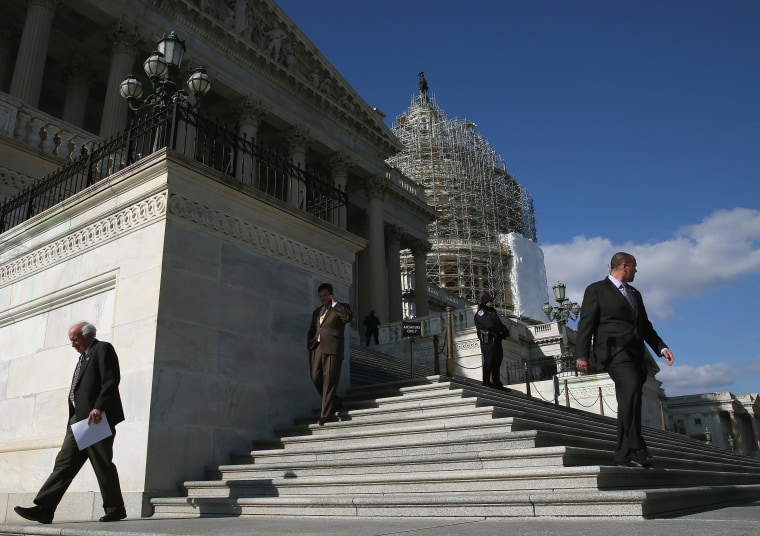Consider the subjects Washington is debating two weeks after the midterm elections and with Congress finishing its work for the year. The Keystone XL pipeline (which would create an estimated 50 permanent jobs, though thousands more temporary construction ones), whether President Obama should take unilateral executive action on immigration, and MIT economist Jonathan Gruber’s controversial comments on passing the health-care law. Compared with all the big problems at home and abroad, our politics right now seems so … small. As National Journal’s Ron Fournier puts it, “This is an era of titanic challenges and tiny politics.” And the biggest takeaway here is that Washington can no longer handle the large issues -- unless it has a gun held to head (the expiring Bush tax cuts, the need to raise the debt limit). So much of this is a function of divided government; elections have consequences, right? But what’s different today is that the American public has noticed that its political system is no longer functioning. Fournier reminds us of this June Gallup survey, which found Americans’ confidence in the Supreme Court (30%), the presidency (29%), and Congress (7%) all reaching record lows. And don’t remind us what Americans’ confidence in the media is.
And when everything -- even on subjects that weren’t controversial decades ago -- turns into a political fight
Yes, the state of American politics can change. Yes, the Founding Fathers set up a system of government -- with all of its checks and balances -- that made governing more difficult than you find in other democracies. And, yes, history rarely remembers the dysfunction and instead focuses on the exceptional achievements. But as we’ve noted before, what separates our current era of politics from past ones is the unwillingness to give the opposition ANY kind of “win.” Ronald Reagan and Tip O’Neill didn’t agree on much and fought over plenty, but they compromised enough on the low-hanging fruit for Americans to have faith in the political system. Ditto George W. Bush and Ted Kennedy when it came to education reform. Yet what’s different today is that there’s no compromise on the low-hanging fruit. And EVERYTHING now turns into a huge political battle, even on subjects that weren’t controversial decades ago -- like when Reagan and Bush 41 used executive action to protect certain undocumented immigrants from deportation.
Senate set to take up vote on Keystone XL pipeline
At 6:15 pm ET today, the Senate is expected to take up legislation to authorize construction of the Keystone XL pipeline, and NBC’s Frank Thorp reports that supporters appear to be stuck on 59 votes -- one short of the 60 to clear a filibuster. Sen. John Hoeven (R-ND), a chief sponsor of the Senate bill, says "we'll get a couple more,” Thorp notes. "At this point, I would say I think we'll get there, but again they're in the maybe column so we'll have to see tomorrow when we vote." More from Hoeven: "I have 59 that are out there publicly, you know who they are, and I think we'll get a couple more. So I think we'll get it. Obviously the key is the Democrat side, you know, we've got 45 Republicans so it's primarily, obviously, the Democrats. We've got to get 15 or 16." Thorp also reports that Sen. Angus King (I-ME), who could be the key vote for passage, says he's a "probable No," but he won't say if that's how he'll vote: "I'm a probable 'No', but they'll get to the 'K's tomorrow and you'll find out. It's right after Kaine, I come right after Kaine." And Sen. Jay Rockefeller (D-WV), who some thought could support the measure, told reporters Monday "I will vote 'No.'"
Obamacare advocates organizing in the red states
NBC’s Perry Bacon: “…North Carolina is at the forefront of a strategy being employed in conservative states across the country: Obamacare advocates working around their state governments to implement the law. In Alabama, Georgia, South Carolina, Texas and other states, there is intense organizing by coalitions of groups to sign people up for Obamacare, which started open enrollment on Nov. 15 for its second year. In some states, these efforts are led by openly liberal groups, such as the Texas Organizing Project, which is involved heavily in ACA promotion but also backed Democrat Wendy Davis’ unsuccessful gubernatorial campaign. In North Carolina, meanwhile, more than 100 groups, mostly non-partisan, have joined the ‘Big Tent,’ ranging from community hospitals to the Legal Aid of North Carolina.”
Begich concedes to Sullivan in Alaska
Finally, here’s the Alaska Dispatch News: “After holding on to dwindling hope for days, Sen. Mark Begich on Monday conceded he had lost his U.S. Senate race to Republican Dan Sullivan. With the concession coming nearly two weeks after the Nov. 4 general election and with few votes left to count, the statement was largely a formality.” NBC News had called the race for Sullivan last week.
Click here to sign up for First Read emails. Text FIRST to 622639, to sign up for First Read alerts to your mobile phone. Check us out on Facebook and also on Twitter. Follow us @chucktodd, @mmurraypolitics, @carrienbcnews
